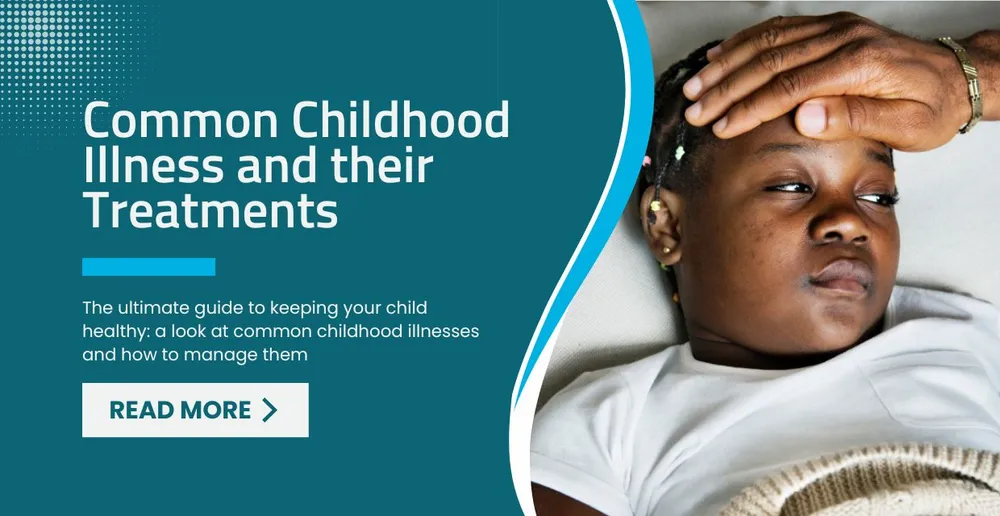As a parent, it can be worrying when your child falls ill, but understanding these common childhood illnesses can help you identify them early and seek the appropriate treatment. They are prone to illnesses due to their underdeveloped immune systems. Knowing which illnesses are common for certain age groups and how serious they can be is essential. We hope this post will be informative and help you feel more confident in caring for your child's health.
Types of Common Childhood Illnesses
Cold and Flu:
Symptoms: The common cold and flu are two of the most common illnesses that affect children. Symptoms include a runny or stuffy nose, cough, sore throat, body aches, fatigue, and fever. Children with the flu may also experience vomiting and diarrhea.
Treatment options: There is no cure for the common cold or flu, and antibiotics are not effective against viruses. Treatment is focused on managing symptoms and preventing complications. Over-the-counter medications can help relieve symptoms such as pain, fever, and congestion. Rest, staying hydrated, and avoiding contact with others can also help prevent the spread of the illness.
Ear infections:
Symptoms: Ear infections are common in children, especially those under the age of three. Symptoms include ear pain, difficulty sleeping, fever, and irritability.
Treatment options: Treatment for ear infections may include antibiotics to treat bacterial infections. Pain relief medication, such as acetaminophen or ibuprofen, can help relieve pain and fever. In severe cases, surgical intervention may be necessary.
Stomach Flu:
Symptoms: The stomach flu, also known as gastroenteritis, is a common illness that affects the digestive system. Symptoms include nausea, vomiting, diarrhoea, stomach cramps, and fever.
Treatment options: Treatment for the stomach flu is focused on managing symptoms and preventing dehydration. Children should drink plenty of fluids and avoid solid foods until symptoms subside. Over-the-counter medications can help relieve symptoms such as nausea and diarrhoea.
Chickenpox:
Symptoms: Chickenpox is a highly contagious viral infection that causes an itchy rash, fever, and fatigue. The rash starts as red spots that turn into blisters and then scab over.
Treatment options: There is no cure for chickenpox, but the illness can be managed with over-the-counter medications to relieve symptoms such as fever and itching. Children with chickenpox should stay home to prevent the spread of the illness. A vaccine is available to prevent chickenpox.
Asthma:
Symptoms: Asthma is a chronic respiratory condition that affects the airways. Symptoms include wheezing, coughing, chest tightness, and difficulty breathing.
Treatment options: Treatment for asthma includes medication to manage symptoms and prevent asthma attacks. Inhalers and nebulizers can be used to deliver medication directly to the lungs. Avoiding triggers, such as allergens and irritants, can also help prevent asthma attacks.
Preventative Measures

Here are some simple steps parents can take to help prevent their children from getting sick:
Vaccinations: Vaccinations are an important part of preventative medicine for children. They can protect your child from a variety of serious illnesses, including the flu, measles, and chickenpox. It is important to follow the recommended vaccination schedule for your child, as this can help ensure they receive the necessary protection.
Good hygiene practices: Good hygiene practices can help prevent the spread of germs that cause illness. Encouraging children to wash their hands frequently with soap and water, covering their mouth and nose when they cough or sneeze, and avoiding sharing utensils or drinks with others can all help prevent the spread of illness.
A healthy diet and lifestyle habits: A healthy diet and lifestyle habits can help boost your child's immune system, making them less susceptible to illness. Encouraging children to eat a balanced diet rich in fruits, vegetables, and whole grains can provide them with the vitamins and minerals they need to stay healthy. Additionally, regular exercise and plenty of sleep can also help keep children healthy and strong.
Regular check-ups with a paediatrician: Regular check-ups with a paediatrician can help ensure that your child is healthy and developing normally. During these visits, your child's paediatrician will perform routine screenings, such as hearing and vision tests, and provide advice on healthy habits and preventative measures. These check-ups can also help catch any potential health problems early, allowing for prompt treatment.
By following these preventative measures, parents can help keep their children healthy and reduce their risk of illness. It is important to remember that even with these measures in place, children may still get sick from time to time. If your child does become ill, it is important to seek medical attention promptly to ensure they receive the appropriate treatment.
Conclusion
Being aware of common childhood illnesses and their symptoms can help parents identify when their child is sick and seek treatment early on. It is also important to practice preventative measures such as vaccinations, good hygiene practices, healthy diet, and lifestyle habits, and regular check-ups with a pediatrician to keep children healthy and reduce the risk of getting sick.
If you suspect that your child is ill or experiencing symptoms of any of the illnesses discussed in this article, it is important to seek medical advice from a healthcare professional. Remember, early detection and treatment can make a big difference in the outcome of an illness.
At LifeCare Hospitals, we understand the importance of quality healthcare for children. If your child needs medical attention, our pediatric specialists are available to provide the highest level of care. Don't hesitate to reach out to us for assistance.



